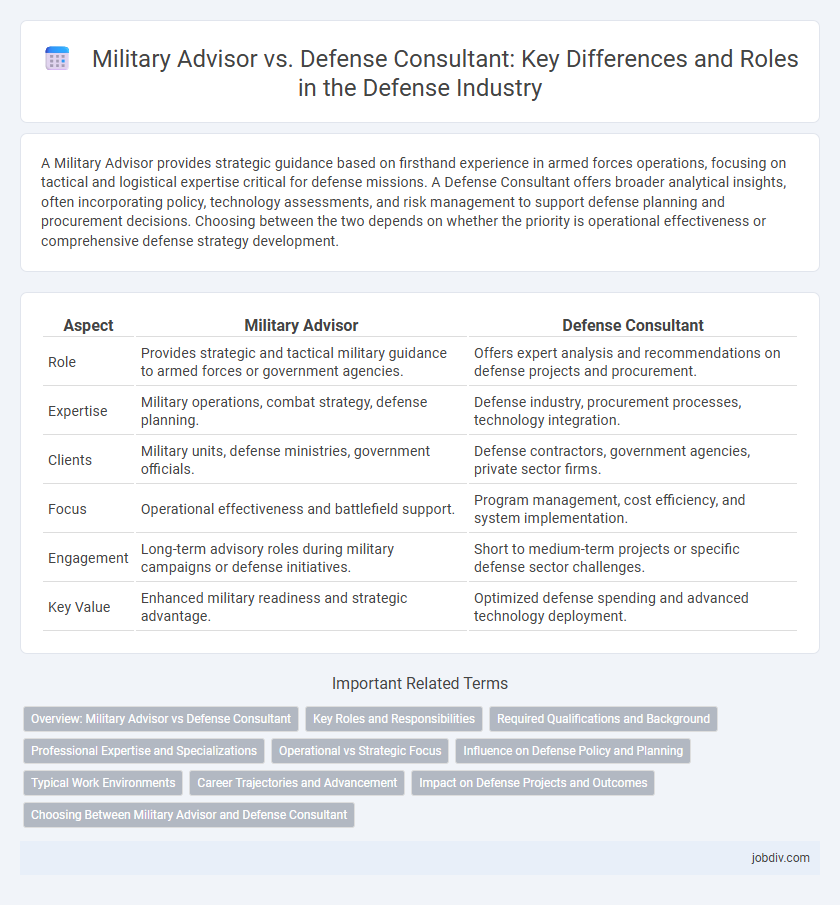A Military Advisor provides strategic guidance based on firsthand experience in armed forces operations, focusing on tactical and logistical expertise critical for defense missions. A Defense Consultant offers broader analytical insights, often incorporating policy, technology assessments, and risk management to support defense planning and procurement decisions. Choosing between the two depends on whether the priority is operational effectiveness or comprehensive defense strategy development.
Table of Comparison
| Aspect | Military Advisor | Defense Consultant |
|---|---|---|
| Role | Provides strategic and tactical military guidance to armed forces or government agencies. | Offers expert analysis and recommendations on defense projects and procurement. |
| Expertise | Military operations, combat strategy, defense planning. | Defense industry, procurement processes, technology integration. |
| Clients | Military units, defense ministries, government officials. | Defense contractors, government agencies, private sector firms. |
| Focus | Operational effectiveness and battlefield support. | Program management, cost efficiency, and system implementation. |
| Engagement | Long-term advisory roles during military campaigns or defense initiatives. | Short to medium-term projects or specific defense sector challenges. |
| Key Value | Enhanced military readiness and strategic advantage. | Optimized defense spending and advanced technology deployment. |
Overview: Military Advisor vs Defense Consultant
Military advisors provide strategic guidance based on direct experience in armed forces operations, offering insights into tactics, weapon systems, and combat readiness. Defense consultants focus on broader defense industry trends, procurement processes, policy analysis, and risk management to support government agencies or defense contractors. Both roles require deep knowledge of defense protocols but differ in their primary objectives and target stakeholders.
Key Roles and Responsibilities
Military Advisors provide strategic guidance based on direct experience in armed forces, focusing on operational planning, tactical execution, and training military personnel. Defense Consultants analyze defense policies and technologies to recommend improvements in procurement, cybersecurity, and risk assessment for government agencies or defense contractors. While Military Advisors typically engage in field operations and mission-specific advice, Defense Consultants offer broader evaluations on defense systems, compliance, and cost-efficiency.
Required Qualifications and Background
Military advisors typically possess extensive active-duty experience, often including leadership roles within specific branches of the armed forces, and require in-depth knowledge of military tactics, operations, and strategic planning. Defense consultants generally have broader qualifications encompassing expertise in defense policy, technology, risk assessment, and project management, often holding advanced degrees in defense studies, international relations, or engineering. Both roles demand a strong understanding of national security issues, but military advisors emphasize operational experience while defense consultants focus on analytical skills and multidisciplinary knowledge.
Professional Expertise and Specializations
Military advisors possess extensive operational field experience, strategic planning skills, and expertise in military tactics, often specializing in active combat scenarios and defense operations. Defense consultants provide broader strategic insights by combining knowledge of military systems, defense procurement, cybersecurity, and risk management, focusing on policy analysis and technological integration. Both roles demand deep understanding of defense protocols but differ in scope: military advisors emphasize frontline expertise, while defense consultants excel in advisory functions across defense industries and government agencies.
Operational vs Strategic Focus
A Military Advisor primarily provides operational guidance, leveraging frontline experience to enhance tactical execution and mission readiness. Defense Consultants concentrate on strategic planning, analyzing defense policies and long-term security implications for governmental or corporate clients. Both roles are critical but differ in scope; Military Advisors emphasize immediate battlefield effectiveness while Defense Consultants focus on shaping overarching defense strategies.
Influence on Defense Policy and Planning
Military advisors provide direct strategic guidance based on operational experience, significantly shaping defense policy and planning through tactical insights and battlefield realities. Defense consultants contribute broader analyses encompassing geopolitical trends, technological advancements, and budgetary constraints, influencing long-term defense strategies and resource allocation. Both roles are crucial in creating comprehensive and adaptive defense policies that address immediate security needs and future challenges.
Typical Work Environments
Military advisors typically operate within armed forces headquarters, military bases, and conflict zones, providing strategic guidance to commanders and government officials. Defense consultants work across a broader range of environments, including defense contractors, government agencies, and private sector firms, focusing on policy analysis, technological development, and procurement strategies. Both roles demand adaptability to high-pressure settings but differ in organizational context and scope of responsibilities.
Career Trajectories and Advancement
Military advisors often have direct operational experience and progress through ranks within armed forces, gaining expertise in strategic planning and combat tactics. Defense consultants typically come from diverse backgrounds including military, engineering, or policy analysis, advancing by leveraging industry knowledge to provide tailored solutions for defense contractors or government agencies. Career advancement for military advisors is often linear and hierarchical, while defense consultants experience lateral growth driven by project complexity and client portfolio expansion.
Impact on Defense Projects and Outcomes
Military advisors bring firsthand operational experience and strategic insights that directly enhance the planning and execution of defense projects. Defense consultants contribute specialized expertise in areas such as technology integration, risk assessment, and policy compliance, optimizing project efficiency and regulatory adherence. Their combined impact significantly improves decision-making processes, resource allocation, and mission success rates within defense initiatives.
Choosing Between Military Advisor and Defense Consultant
Choosing between a military advisor and a defense consultant depends on the project's scope and expertise required. Military advisors offer battlefield experience and strategic insights, ideal for operations and tactical planning, while defense consultants provide broader industry knowledge including technology development, procurement, and policy analysis. Understanding this distinction ensures optimized decision-making for defense contracts or military strategy development.
Military Advisor vs Defense Consultant Infographic

 jobdiv.com
jobdiv.com